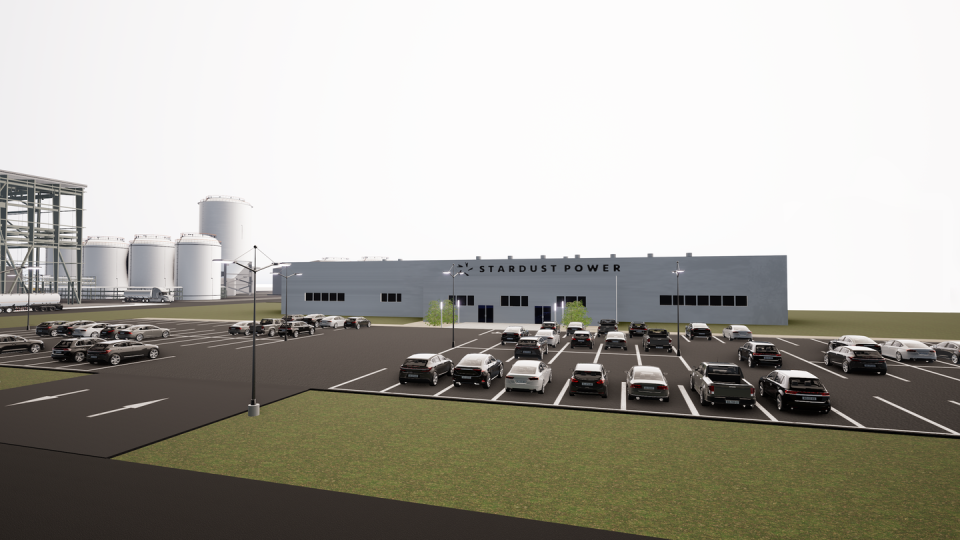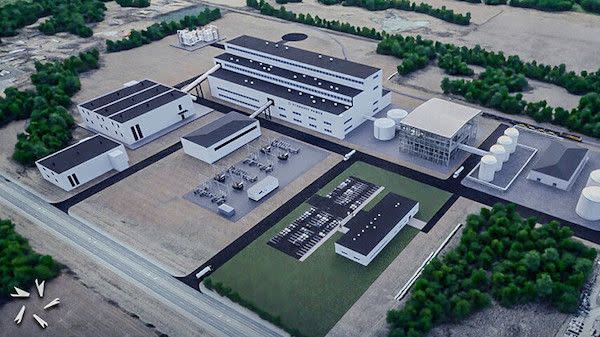Big Lithium Processing Plant Planned in Oklahoma

"Hearst Magazines and Yahoo may earn commission or revenue on some items through these links."
Startup company Stardust Power hopes to get a big processing plant built in Oklahoma, where it says it will be able to process 50,000 tons of lithium.
The plant would refine lithium obtained via underground sources, extracting the metal from a brine.
The Inflation Reduction Act requires an increasing amount of domestically sourced minerals, which refineries like that proposed by Stardust Power and others would fulfill.
Roshan Pujari, co-founder of battery-grade lithium refinery startup Stardust Power (SP), was addressing a room full of potential investors May 15 at an upscale waterfront hotel in Greenwich, Connecticut.
The company has access to up to $30 million in financing to build and operate a brine refinery on 66 acres in Muskogee, Oklahoma that can process 50,000 tons of this critical EV battery mineral annually (enough to supply 1.1 million electric vehicles). And it needs more construction money as it prepares to go public via a SPAC deal.
Total cost of the project will be around $1.2 billion, with the first phase (getting the company to 25,000 tons per year) costing around $650 million. Pujari told Autoweek that up to 80% of the total could be through project finance, with the balance via sponsor equity including potential government grants.
The SPAC, announced last year, is due to be completed by the end of the second quarter of 2024.
“Given that this is a lithium processor, it might be one of the rare instances in which a SPAC actually has a chance of succeeding,” said Sam Abuelsamid, principal analyst for transportation and mobility at Guidehouse Insights in Detroit.
“The Inflation Reduction Act clean vehicle credits are ratcheting up their requirement for the domestic content of minerals. We need more domestic supply because by 2030, there will be close to a terawatt of cell capacity in North America. That’s a lot of lithium.”
Stephanie Chapelliquen, associate director at Guidehouse, says that “localization will be key for everything, and incentives are making it move faster.” Importing lithium from “friendly” but far-away markets like Australia and South Korea will add a lot of transportation-based carbon into the process.
“We would still want processing here even without incentives,” Chapelliquen said.

Stardust’s SPAC partner is Global Partner Acquisition Corporation II, which has more than $3 billion in assets under management. In a statement, GPAC II Chairman and Chief Executive Officer Chandra R. Patel called Stardust “a pioneering American lithium refiner with impressive growth potential and a massive addressable market.”
Stardust is hoping to start lithium production in the first quarter of next year. “The U.S. has been asleep at the wheel, offshoring critical mineral mining and refining,” Pujari said.
Stardust is hoping to start building the plant in 2025. “The U.S. has been asleep at the wheel, offshoring critical mineral mining and refining,” Pujari said. His company is focused on harvesting lithium from brine, in part “because it is so difficult to get permits for open-pit mining,” he said.
About 60% of global lithium extraction is from brine via huge evaporation ponds like those in use in Chile, Argentina, and Bolivia. The lithium gained by that drying process goes through a purification process to remove other metals.
China has no more than 8% of the world’s lithium reserves, but hosts 80% of its lithium production, and 70% of cell manufacturing, says the Organization for Research on China and Asia. China also processes 67% of global lithium (plus more than 70% of crucial minerals cobalt and graphite).
The Biden Administration, well aware of that situation, has prioritized its incentives on EVs built in the US with American batteries and locally sourced critical minerals. To that end, SP has applied for a grant from the $3.5 billion in Bipartisan Infrastructure Law funds that Department of Energy has earmarked to help develop US battery capacity.

A bullet point in the Biden plan is “advancing the domestic processing capacity of minerals necessary for battery materials and advanced batteries.” Stardust has applied for between $200 and $225 million in grants and incentives, and hopes to get word on them by the third and fourth quarter of this year.
Stardust is also hoping to tap into up to a potential $257 million in Oklahoma state incentives, and also hire from the area’s supply of highly trained oil and gas workers. Its central-U.S. Muskogee location is close to highways, rail lines and the inland waterway, easing import and export of lithium material.
“Oklahoma has a lot of fast charging stations for EVs as well as extensive oil and gas operations,” said John Riesenberg, Stardust’s managing director for Oklahoma. “We are an all-of-the-above energy state that is pro-business and offering great incentives.”
Does the US have its own supply of lithium? You bet, though it’s a modest 3% of world reserves, concentrated in states including Nevada, California (where projects are underway at the Salton Sea), and Utah.

There’s currently only one working lithium mine, an Albemarle facility in Silver Peak, Nevada. Stardust has 35,000 acres of brine-producing land under its control in Nevada and Utah.
Other players are also on the move. Tesla broke ground on a $1 billion lithium refining operation near Corpus Christi, Texas, last year. “The choke point is much more on refining capacity than it is on mining,” Elon Musk told investors in 2023.
“Lithium is actually very common throughout the world, including in the US… Like, instead of making a picture-sharing app, please refine lithium. Mining and refining, heavy industry, come on.”
Another company, Lithium America, has gotten a conditional commitment for a $2.3 billion loan to help construct a lithium mine in Humboldt County, Nevada. General Motors said in 2023 that it would invest $650 million in that project, which would give it the right to buy up to 40,000 tons of the mine’s output for 15 years.
GM is also working with Posco Chemical in Quebec on a $400 million facility to produce cathode-active material for GM’s Ultium batteries. Honda is also working with Posco on a cathode-active plant in Canada. ExxonMobil is developing a lithium production facility in Arkansas.
The domestic North American lithium industry is ramping up, but not fast enough to avoid continuing concern about foreign sources for lithium.

 Yahoo Autos
Yahoo Autos 